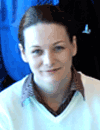08:00 | Registration |
|
Applications of Sequencing Data |
| |
09:00 |  | Keynote Presentation Making a Definitive Diagnosis: Opportunities and Challenges Associated With Clinical Application of Whole Genome Sequencing
Elizabeth Worthey, Assistant Professor, Medical College of Wisconsin, United States of America
At MCW we recently completed a pilot program aimed at developing a clinically appropriate system for WGS MDx. We defined processes for case selection, education, consent, analysis, data return, and reporting. I will discuss the opportunities and challenges associated with developing and maintaining this program, and review details from specific cases. |
|
10:00 | ChIP-Enrich: Linking Genomic Regions to Biological Gene Sets Through Enrichment Testing
Maureen Sartor, Assistant Professor, University of Michigan, United States of America
We present a novel gene set enrichment testing method for ChIP-Seq or DNA methylation data that empirically corrects for multiple biases. We show the advantages of our method, ChIP-Enrich, compared to current alternatives using several ChIP-Seq datasets with differing properties. |
10:30 |  Technology Spotlight: Technology Spotlight:
Automated De Novo Genome Assembly Using DNASTAR Software
Tom Schwei, Vice President/General Manager, Dnastar Inc
DNASTAR software uses an innovative approach to enable researchers to rapidly and easily close de novo bacterial genome assemblies on a standard desktop computer. By using data from a closely related strain to guide the assembly, the assembly process can be dramatically expedited, potentially saving many weeks of work or more.
|
10:45 | Coffee and Networking in Exhibiton Hall |
11:15 | Small RNA as Biomarker for Cancer Diagnosis
Harry Gao, Director, City of Hope Beckman Research Institute, United States of America
We were the first to develop the small RNA-deep sequencing in FFPE sample. We have discovered several novel miRNA-like small RNA differentially expressed in Renal Cell Carcinoma. |
|
RNA-Sequencing |
| |
11:45 | Trinity as a Platform for RNA-seq Assembly and Biological Exploration
Brian Haas, Manager, Broad Institute of MIT and Harvard, United States of America
|
12:15 |  Technology Spotlight: Technology Spotlight:
For Next-generation Sequencing Library Preparation: Long-span, Mate-pair Scaffolding and Methods for Faster Library Creation
Curtis Knox, Vice President, Lucigen
The NxSeq™ 40 kb Mate-Pair Cloning Kit facilitates the creation of scaffolds for de novo genome assembly. Supporting either Illumina or 454 sequencing, the kit produces 40 kb paired-end sequences with greater efficiency than existing long-span, mate-pair systems. In addition, NxSeq DNA Sample Prep Kits can be used to streamline workflow and speed up DNA library preparation for next generation sequencing. A fully automated system for library preparation will also be discussed.
|
12:30 | Lunch and Networking in Exhibition Hall |
13:30 | Poster Viewing Session |
14:15 | STAndardized RNA SEQuencing (STAR-SEQ): PCR-driven Library Preparation in Presence of Internal Standard Mixtures Optimizes Quality Control and Quantification in RNA Sequencing and Reduces Cost
James Willey, Professor, The University of Toledo Health Science, United States of America
PCR-driven library preparation in presence of internal standard mixtures controls for inter-sample variation in interfering substances, inter-laboratory variation in transcript representation, and 1000-fold inter-gene convergence of transcript representation, resulting in 1000-fold reduction in number of reads required for reliable quantification. |
|
Sequencing Platforms and Methods |
| |
14:45 | Evaluating RNA-Seq for Biomarker Discovery in Peripheral Whole Blood
Scott Tebbutt, Associate Professor, University of British Columbia, Canada
We performed RNA-seq transcriptome analysis of blood leukocyte samples from six healthy individuals (three females and three males). Using subject-specific samples as well as pooled technical replicates, we have evaluated the benefits and limitations of globin transcript depletion for next-gen biomarker discovery in whole blood. |
15:15 | Coffee and Networking in Exhibiton Hall |
16:00 | Re-sequencing the Human Genome Reference Sequence
Stephan Schuster, Professor, The Pennsylvania State University, United States of America
With new sequencing technology available it has become possible to largely improve the quality and completeness of the human genome reference. |
16:30 | Evaluation of Strand-specific RNA-Seq Protocols
Allison Peak, Lab Technician, Stowers Institute for Medical Research, United States of America
We tested three commercially available kits for strand-specific RNA-Seq construction - Epicentre ScriptSeq v2, Illumina TruSeq Stranded RNA, and NuGen Encore Complete DR. We looked at the individual kits to evaluate their benefits and limitations. |
17:45 | Round Table Discussions in the Exhibition Hall |
19:00 | End of Day One |


